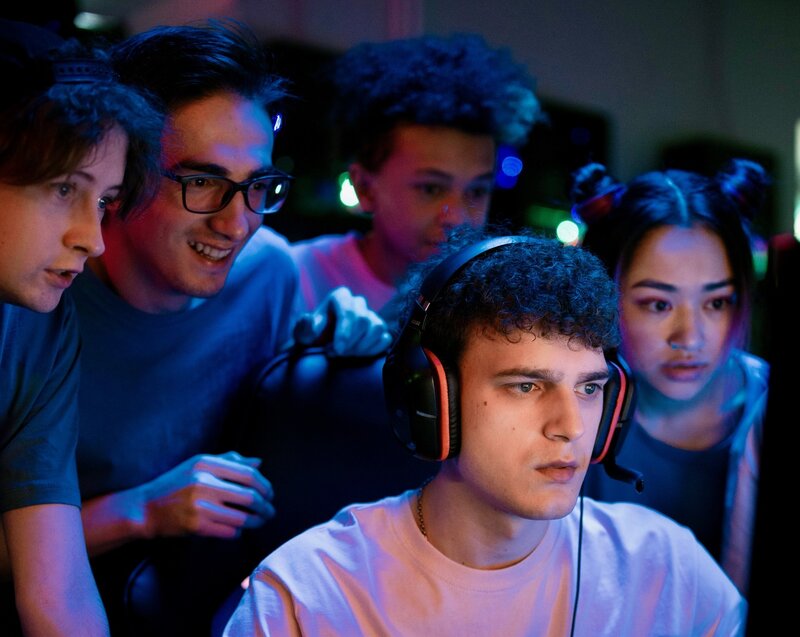 I love first-person shooters.
I love first-person shooters.
Titles like Call of Duty and Battlefield (RIP) have filled my gaming library since high school.
Sure, I’ve also enjoyed other genres like RPG’s, sports games, and single-player adventures since I was a kid, but there’s something about multiplayer shooters that scratches my gaming itch.
The immersion that comes from fighting in realistic war-torn environments, the camaraderie that develops over last second victories with random teammates, and the competition that drives you to outsmart rival players all contribute to my habit of playing for hours on end.
Plus, it also helps that I’m pretty good.
No, I’m not a professional gamer or anything like that. I’m just a guy who used the time left by his lacking social life to get good at games when he was younger.
Unfortunately, my improved kill-death ratio never impressed the ladies, but as for my button-mashing peers, they were amazed.
I don’t game as much as I did then now that I’m an adult, but to this day I’m still asked how I consistently top scoreboards when I hop online.
A friend asked that familiar question after our recent session, and well, I wasn’t sure how to answer. I eventually gave him a list of tips to improve, but neither he nor I was satisfied with my hasty response.
Now that I’ve had time to think on it though, I see the bigger picture that eluded me then. I realize now that the secret to being good at shooters—or anything else for that matter—is the simple act of winning small.
Winning Small in the Gaming World
 So what is “winning small”?
So what is “winning small”?
It’s exactly what it sounds like.
It’s when you take an overwhelming goal or challenge, and break it down into smaller, more achievable tasks. You then take those mini-challenges and practice them until you reach mastery.
Or to put it another way, winning small is about winning the game within a game.
Take my friend’s dilemma for example. His goal was to become good enough to top the scoreboard on a regular basis—a feat that sounds impossible to new players and even some veterans.
So how would we use the concept of winning small to make this attainable?
It’s simple. We break down the elements of high-scoring gameplay and practice them individually.
As an above average player myself, I know that first person shooters are all about prediction and positioning. You need to predict where enemy players are likely to be and position yourself into the best place to fight them.
Using this knowledge, I could give my friend the following three tasks to practice the next time he plays:
- Check for cover when entering a gunfight. The least exposed player usually wins.
- Note each time an opponent shoots you from behind. Experiment with safer routes to lower that number each game.
- Center your screen over places where enemies are likely to be. Pre-aiming like this will help you beat players near windows, rooftops, and other common power positions.
Any player who practices those bite-sized tasks will see an improvement in two weeks.
Sure, you can argue that those are menial chores, but that’s the whole point of winning small. These should be simple and specific actions that are strongly related to the big picture.
If my friend followed through with my plan here, his prediction and positioning would improve. No, he wouldn’t reach his ultimate goal of scoreboard-topping anytime soon, but chaining those small wins together will put him on the path to mastery—and the difference in his stats would be proof.
Winning Small in Real Life
 “Well it’s cute that your idea works in a video game, but what about real life? Y’know, the serious stuff?”
“Well it’s cute that your idea works in a video game, but what about real life? Y’know, the serious stuff?”
It works the same way.
Let’s say you’re a quality manager at a factory that makes gaming accessories. Your portfolio includes everything from custom controllers to headsets and gaming keyboards.
Upper management has just tasked your department with the goal of saving $50,000 in scrap costs this year, and your peers have no idea how to reach it.
This is where you win small.
Most people will see that 50K number and start some huge year-long project to meet the total, but you know better than that. So instead of trying to reach that number in one effort—which would be the equivalent of killing ten birds with one stone—you’ll break the task into smaller goals.
You would use your factory’s data to map products with the highest scrap costs. Then you’d rely on your team’s experience to find where improvements could be made.
The 50K target comes out to a little more than $4,000 a month. So an improvement to 10 of your worst offenders could add up to that monthly goal. Each mini-project would have a dedicated team and scope of its own, but together, they’ll all save the target value in the long run.
Even if one of your projects fails or is deemed too difficult, you can always go back to your portfolio, pick another low performer, and then start fresh—something that can’t be done in a year-long effort.
3 Tips to Help You Win Small
Now that you know the concept of winning small and we’ve seen how versatile it is, I’ve included three tips here to help you use it for whatever you do.
Tip #1: Learn “The Right Way” First
 Action is useless without a good strategy.
Action is useless without a good strategy.
Winning small is about mastering small activities related to a larger goal. But if you focus on the wrong actions, you’ll waste plenty of time.
Going back to my gaming buddy for example, he wanted to consistently top scoreboards in first person shooters. I previously said that prediction and positioning are king in FPS games…but what if I didn’t know that?
What if I thought my aim was the biggest reason why I was good?
Well, my list of tasks would be different. Instead of teaching my friend the fundamentals of movement, cover, and preparation, I’d advise him to perfect his aim.
He could then buy a custom controller for more precision, use all his gun’s recoil-control attachments, and practice his shot in private matches. But even after a month later, he wouldn’t see the progress he craves.
Yes, good aim helps you win gunfights in shooters, but every competent player has good aim. Working solely on your aim to get good at shooters is like practicing layups all day to make an NBA team.
That’s not how it works.
To be successful, you have to win at small actions with the highest impact. Good strategy shows where that impact lies.
This is why you read books, ask for advice, and learn from people’s experience. You have to rely on the experts before you can master anything yourself.
Tip #2: Stay Connected to the Big Idea
 This may sound counter-intuitive, but winning small works best when you think big.
This may sound counter-intuitive, but winning small works best when you think big.
Winning small works because it shows how great feats can be accomplished through small actions. It’s a top down approach that relates day-to-day tasks with much larger goals.
If you don’t link your actions to the big picture, however, you’ll just get stuck in the weeds. Burnout, frustration, and discouragement will all come because your actions became busywork.
That’s not what you want.
You don’t win small for the sake of winning small. You win small because the benefit is worth it.
If you’re that quality manager at the gaming factory, everyone on your team should know why they’re attacking their projects. “Because I said so” isn’t enough.
Let them see the financial reasoning. Show them the potential effect of their actions. Support your answers with data when they ask “why?”.
It’s hard to stick with even the smallest tasks when you can’t see how they make a difference. That’s why we all need big ideas.
Big actions are overwhelming, but big ideas inspire.
Our attitudes change when we find purpose behind what we do. So please use this knowledge in your own quest to mastery.
Tip #3: Accept All Feedback as Good Feedback
You know the worst answer people give when you ask them something?
Trick question.
The worst answer is the one you don’t get.
I’d rather be told “no” to my face with a list of reasons why instead of being left without a response. Any answer helps me understand the effect of my actions, and I can use that data later to change my approach.
This is the mindset you need to win small.

There is no such thing as bad feedback. Hate mail, criticism, rejection, it’s all valuable. So don’t get caught up by how it makes you feel in the moment.
Far too many of us take “bad” feedback to heart. We let it crush us and stop our progress, but mastery requires us to handle that noise.
People are so scared of feedback these days that game developers have even removed death stats from scoreboards. The number of deaths players take in a first person shooter is valuable info, yet now we’re all left in ignorance because some people’s egos got hurt.
Sure, you can find those stats buried in private menus, but that’s not the point. One of the biggest reasons to play a multiplayer shooter is to see how you relate to a community. And public stats tell excellent stories about each player’s relationship.
Data like this is nothing to be afraid of. In fact, bad stats are actually a sign of opportunity.
We all have to stop thinking that we deserve to be good. Everyone is bad initially, and naturals do not exist. Yeah, one person’s “bad” may be better than my “bad” at the start, but relative to our potential, we both stink.
The truth is that no veteran was more skilled as a rookie. So don’t be afraid to work through the low points.
Go ahead and step on the scale, post your article in public, or ask that expert for advice. Yes, the response may hurt in the short-term, but the data you’ll gain is too valuable to miss.
Ready to Start Winning?
 And there you go. You now know the secret.
And there you go. You now know the secret.
Winning small is how you get good at anything in life.
Whether it’s writing articles for your blog, increasing profits at your business, or learning how to cook without a microwave, the small actions you take today can transform you over time.
So even if you’re a discouraged FPS fan like my friend, just try this out, and who knows?
You might actually stand a chance when I see you online.
-Drew
Photo Credits (by order of appearance):
- Ron Lach (x2)
- fauxels
- Max Fischer
- Andrea Piacquadio (x2)
- Yan Krukov
All from Pexels.com
Leave a Reply